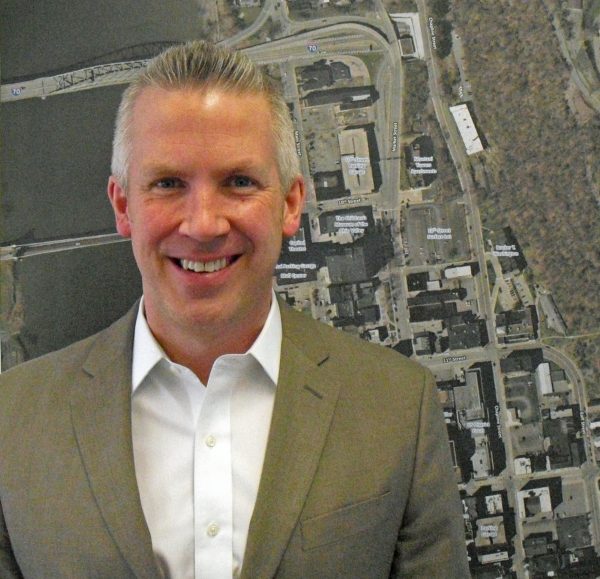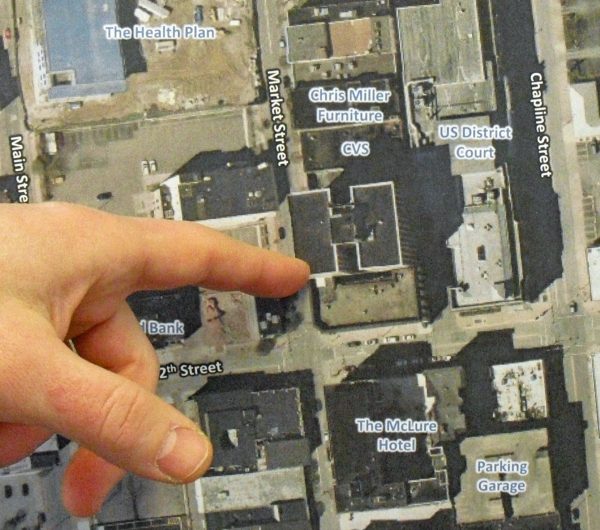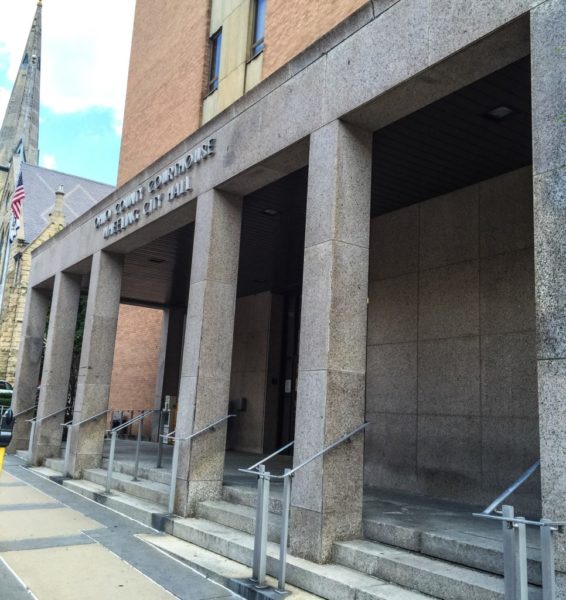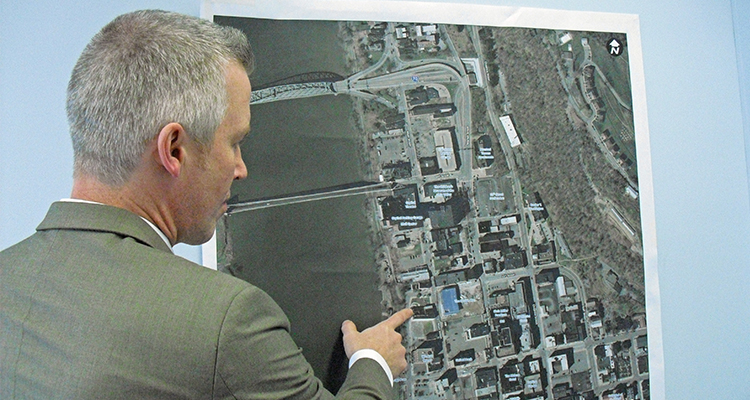Editor’s note: This is the first in a series of Weelunk stories looking at the inner workings of the city. “Wheeling@Work” is an effort to provide our readers with insight and information into our city government, highlighting the personalities, programs and processes at work within the City of Wheeling. It is our hope that readers gain a greater understanding of the opportunities and challenges we face in growing a Wheeling that is more forward-thinking and dynamic. Today’s story features a look at what Mayor Glenn Elliott most hopes to accomplish during his term in office.
It’s 10 a.m. on a Thursday, and Wheeling’s ever-dapper mayor is looking uncharacteristically weary.
A scandal concerning the city manager and a DUI charge is still unfolding, and major development deals are hanging in the balance. Part-time status or no, Mayor Glenn Elliott has been scrambling between a tiny mayoral office tucked next to the currently empty city manager’s domain and his own law practice since the wee hours of the previous Saturday.
At Elliott’s downtown home — inside some 30,000 square feet of ongoing restoration that’s his personal contribution to Wheeling’s city center revival — his beloved dog, Porter, isn’t doing well. And, longtime girlfriend Cassandra Wells may very well be cooking up more ideas for a space that boosts the occasional 20-foot ceiling. He’s the demolition guy, tearing down drop ceilings and patching plaster many a weekend.

Elliott pauses at that latter thought, smiling in a full-faced way. “She really has an eye for design,” he says of Wells, before switching the conversation back to three loudly ticking clocks.
One: He doesn’t want the city manager thing to disrupt or, worse, derail pending or prospective development. Options including the calling in of an outside consultant are already in review.
Two: Two particular downtown projects feel critical. Particularly as his first term in office is now down to a year and change — and he has yet to decide whether he wants to run again.
Three: He wants the love the city is pouring into the downtown to wick into all Wheeling’s neighborhoods — by, well, yesterday.
A MAN WITH A PLAN
The mayor points to an I-shaped building smack in the middle of an aerial photo of the downtown. The photo is one of few adornments to his mayoral office — others being a small bust of Lincoln, an American flag and a framed drawing of the first incarnation of his 1892 home, originally the City Bank of Wheeling.
The building at his fingertip — all 12 stories, 144,000 square feet and dodgy roof of it — formerly housed Wheeling-Pitt steel.

“It’s taking on water, and it’s not being heated,” he says, his phone buzzing against his desktop, as it has through much of the interview. “That does not bode well.”
Of all the downtown projects in which the city is involved — about 20 instances in which creating tax credits/incentives or direct investment are in play or being pondered — this is the one Elliott feels most keenly. He worries there will be an incident — perhaps a brick falling to the sidewalk — that will spark an outcry for demolition.
If that would come before restoration can work the kind of magic that resurrected the former Wheeling Stamping Co. as the Orrick law firm — Elliott shakes his head at the possibility of losing a Manhattan-worthy part of Wheeling’s downtown gestalt. “(That) would be absolutely shameful. The future would judge us harshly.”
Ironically, saving Wheeling-Pitt may require persuading the city to build another building.
Steve Coon, an Ohio developer who has been lauded for preserving iconic buildings, hopes to revive Wheeling-Pitt as market-rate apartments. He wants to city to meet him partway by funding and building a parking garage for prospective residents, who would pay for any spaces they use.
The city already owns a street-level lot nearby (where another building of old was torn down) and has other potential locations that could also be considered, Elliott says. It’s really a question of timing and money.
“If the city doesn’t build this garage, no one else will,” he believes.
This declaration comes with an explanation loaded with the kind of budget numbers with which Elliott’s brain is clearly full. A parking-garage space in Wheeling tops out at about $60 per month, compared to $200 or so in Pittsburgh. Elliott says the local rate simply can’t provide enough revenue to draw for-profit dollars.
He also believes Coon has the business and technical chops to pull off a 12-story project.
Coon — who recently purchased the basket-shaped Longaberger office in Newark, Ohio — has been redeveloping historic buildings since the 1970s, according to GateHouse Ohio Media. He’s worked on buildings throughout Ohio and was honored with the Preservation Hero Award by Heritage Ohio, a non-profit dedicated to revitalization and preservation in that state.
“I kind of look for those cities that have that potential to really go to that next level,” Coon told Columbus Dispatch and Canton Repository reporters who contributed to the Longaberger story.
As the parking-garage/Coon proposal runs the political gauntlet, Elliott stresses his belief that linking public dollars to private is a pledge of confidence in Wheeling’s future. “There’s only so much city money at the table,” we have to use it as leverage to get private investment.
Current reports have the garage proposal in the $11 million range, with Coon’s investment proposal being approximately twice that.
OPTION B
While the clock hands turn on Wheeling-Pitt, Elliott is also eyeing that notable-new-construction possibility for downtown — the construction of a public-safety building.
The approximately $22 million proposal, which came up for a vote in November 2018, got majority support. Fifty-four percent in favor is not enough by state law to swing a bond issue and resulting tax levy — West Virginia requires a 60 percent supermajority in such cases. But, Elliott considers the number high enough for a mandate he is willing to both take on now and pass as a baton to Wheeling’s next mayor if needed.
“‘Shocked’ is probably not a fair enough statement,” he said of seeing the conditions police and fire departments are working in when he ran for mayor in 2016.
Given crowding issues at police headquarters, which is housed in the City-County Building, and maintenance problems at fire headquarters, which is tucked under a parking garage in Center Wheeling, he still sees the combo of a new building for fire and police alongside renovations at neighborhood fire stations as the way to go.
Denied funding from a special tax levy by the election loss, he tends to favor an employment tax. Noting Wheeling is the only city in West Virginia’s top seven by population to not have such a tax, he believes a $2 or $3 per-week fee on each person working inside the city limits could have legs.
On the plus said, he says, it includes out-of-state workers, who are otherwise untapped for services they may use during their workdays. It also leaves out retirees and the disabled. On the downside, he notes the tax has no income consideration. A CEO is taxed at the same rate as a minimum-wage worker.

A GOOD PLACE
A third priority, as also outlined in Elliott’s recent State of the City address, is to make methodical investments in the city’s other neighborhoods.
Elliott refers to new playground equipment installed in pocket parks throughout the city as an example of this. Overall beautification, paving, sewer-line upgrades and trash issues may matter more to local residents than the future of Wheeling-Pitt, he says.
Who cares if downtown is coming back if the property next door is a hot mess? Elliott asks. “That (next door) affects you every day.”
Everyday city life is something he certainly gets — both as a resident of downtown and mayor. With nearly three years of Wheeling leadership under his belt, Elliott acknowledges the city is pretty much his first thought upon waking and last thought as he drifts off. “It’s always something.”
But, it’s a good something, he says.
Noting the city is already reaping the rewards of revival efforts by two former mayors — Andy McKenzie and Nick Sparachane — he wants to finish out his remaining one to five years of service as part of that long-range continuum.
“It has to be done piece by piece, but it shouldn’t be like whack a mole,” Elliott says of it likely taking decades of rebuilding to turn around decades of decline. “There has to be some cohesion.”
• Nora Edinger writes from Wheeling, W.Va., where she is part of a three-generation, two-species household. A long-time journalist, she now writes in a variety of print and e-venues, including her JOY Journal blog at noraedinger.com. Her first work of fiction, a Christian beach read called “Dune Girl,” is available on Amazon Kindle.


